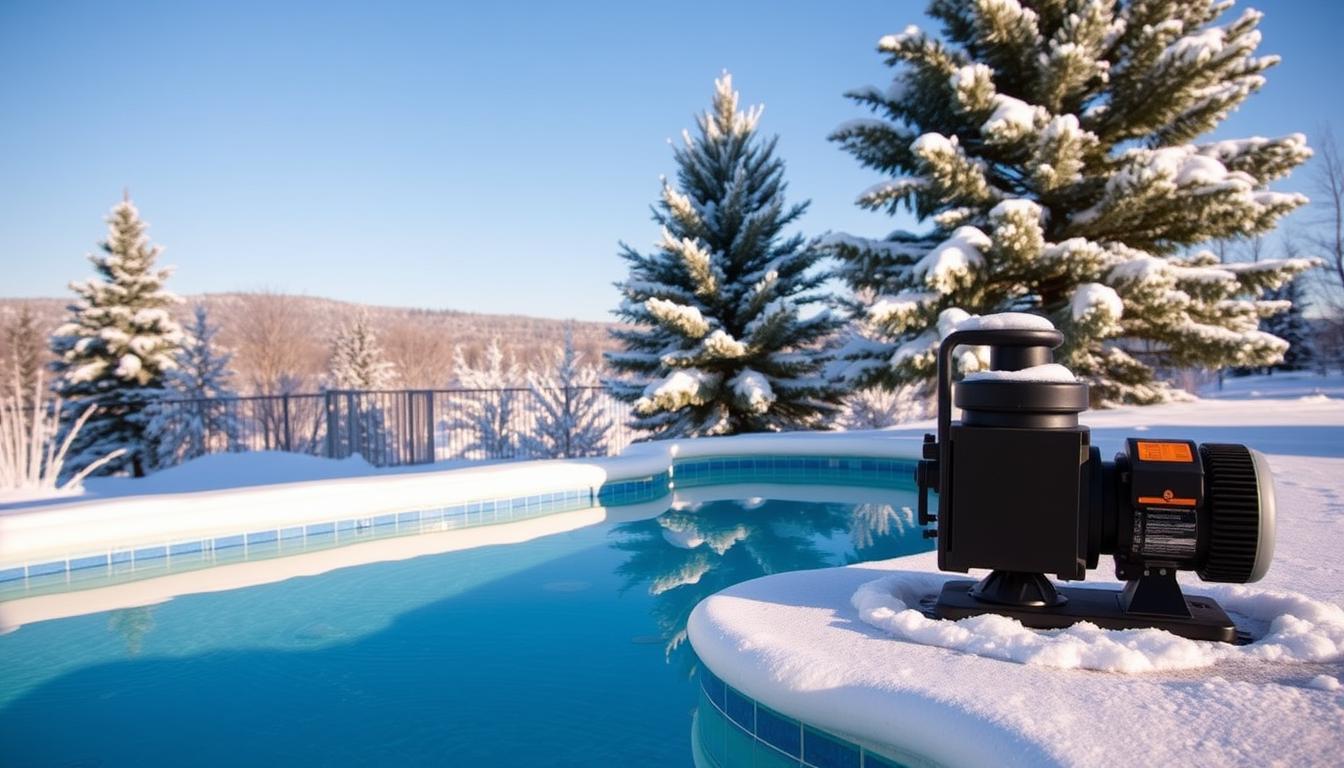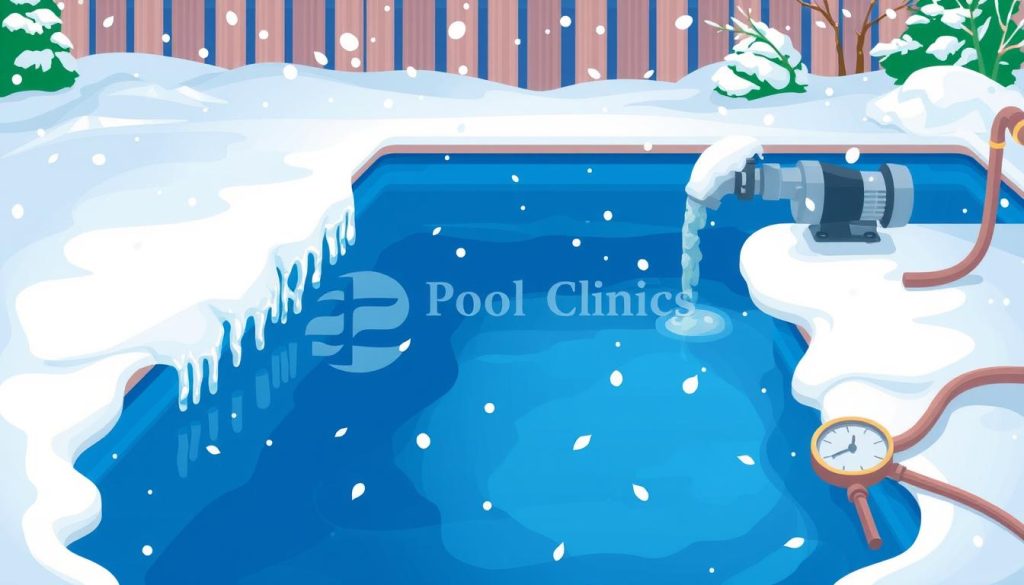
Winter’s chill doesn’t mean neglecting your pool. Proper circulation and filtration are vital for pool health. Let’s explore expert tips for running your pool pump in winter.
Keep your backyard oasis in top shape all year round. We’ll share recommendations to ensure your pool stays pristine during colder months.
Pool pump operation is crucial in winter, despite decreased usage. It prevents algae growth and maintains balanced water chemistry. Dallas pool owners don’t need to winterize due to mild temperatures.
Keep water circulating and use a freeze guard mechanism. This protects your pool equipment and plumbing throughout winter. Your pool will stay well-maintained with these simple steps.
Key Takeaways:
- Running your pool pump in winter is crucial for maintaining water quality and preventing algae growth.
- Experts recommend running your pool pump for 4-6 hours per day during the winter months.
- Variable-speed pumps offer energy efficiency and cost savings compared to traditional single-speed pumps.
- Using a timer to automate your pump’s running schedule can help optimize energy usage and reduce costs.
- Adjusting pump run times based on factors such as pool size, weather conditions, and unique maintenance needs is essential for effective winter pool care.
Understanding Pool Pump Functionality in Winter
Cold winter months bring questions about optimal pool pump running time. Pumps maintain pool health and clarity year-round. Knowing the right duration for winter operation is key for efficient maintenance.
Summer requires longer pump runs. However, winter needs differ. Understanding the pump’s winter role ensures proper care and saves money.

Why Run the Pool Pump in Winter?
Running your pool pump in winter is crucial. It maintains water circulation and prevents stagnation. This stops harmful bacteria and algae from building up.
Circulating water spreads chemicals evenly. This keeps your pool sanitized and balanced. It also prevents damage from freezing temperatures.
- It helps maintain proper water circulation, preventing stagnation and the buildup of harmful bacteria and algae.
- Circulating water distributes chemicals evenly, ensuring that your pool remains sanitized and balanced.
- Proper circulation also helps prevent damage to your pool’s surfaces and equipment caused by freezing temperatures.
Winter pump operation saves on costly repairs. It ensures your pool is ready when warm weather returns.
The Right Duration
Ideal winter pump time depends on pool size, climate, and equipment. Generally, run your pump for 4-6 hours daily. This cycles all water through the filter once.
The easiest rule to follow is to run your filter for 1 hour for every 10 degrees of the outside temperature.
For 50°F average temperature, run your pump about 5 hours daily. Adjust based on your pool’s specific needs.
| Season | Typical Pump Running Time |
|---|---|
| Summer | 8-12 hours per day |
| Winter | 4-6 hours per day |
Follow these winter pool pump tips for optimal pool health. Stick to a proper swimming pool pump winter schedule. You’ll achieve pool pump energy saving in winter too.
Recommended Running Times for Winter
Winter pool pump operation is crucial for proper water circulation and filtration. Most pool pumps need to run 4-6 hours daily in winter. Several factors can affect the optimal running time for your pump.
Factors Influencing Pump Run Time
Consider these factors when deciding on pool pump hours for winter:
- Pool size and volume: Larger pools may require slightly longer running times to ensure complete water circulation.
- Pump type and speed: Variable-speed pumps offer energy efficiency by allowing you to adjust the speed based on your pool’s specific needs.
- Pool usage and exposure: Covered pools or those with minimal debris might need less runtime compared to uncovered or heavily used pools.
Try to cycle all water through the filter once daily. Some filters may need more time to clean effectively. Sand filters often require longer than cartridge or diatomaceous earth (DE) filters.
Energy Efficiency Tips
Optimize your pool pump winter maintenance and save energy with these tips:
- Use a timer to automate the pump’s schedule, running it during off-peak hours when electricity rates are lower.
- Upgrade to a variable-speed pump, which allows you to adjust the speed based on your pool’s specific needs, leading to significant energy savings.
- Utilize a pool cover to reduce debris and evaporation, minimizing the need for filtration and chemical use.
| Pump Type | Recommended Winter Run Time |
|---|---|
| Single-speed | 4-6 hours per day |
| Variable-speed | 3-4 hours per day |
Understanding pool pump factors helps maintain your pool efficiently. You can ensure proper maintenance while reducing energy use and costs. Implement these practices for a well-maintained pool during winter.
How Long to Run Pool Pump in Winter
Winter pool pump run time depends on factors like weather and maintenance checks. Adjusting your pump’s runtime helps keep your pool in top shape during cold months.
Adjusting Pump Run Time Based on Weather Conditions
Run your pool pump 24/7 when temperatures drop below freezing. This prevents water from freezing and damaging your equipment.
If using a pool heater as a freeze guard, turn it on before freezing temperatures hit. Monitor weather and adjust your pump’s runtime to keep your pool safe.
Maintenance Checks
Winter is perfect for routine maintenance checks on your pool pump and equipment. Regular inspections help spot issues early, saving time and money.
Clean your filter every 4-6 months or when pressure stays high. Watch for water evaporation, which is typically 1/4″ per day year-round.
Excessive water loss may signal a leak. If you suspect a leak, contact a professional for help.
Adjust pool pump winter runtime and do regular maintenance to keep your pool in great shape. This ensures your pool is ready when warm weather returns.







